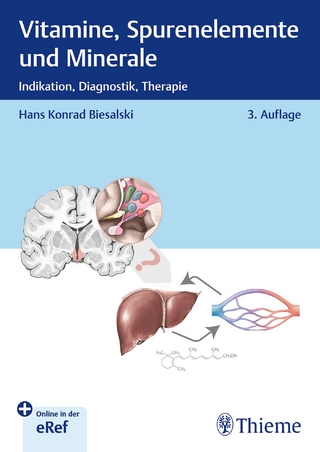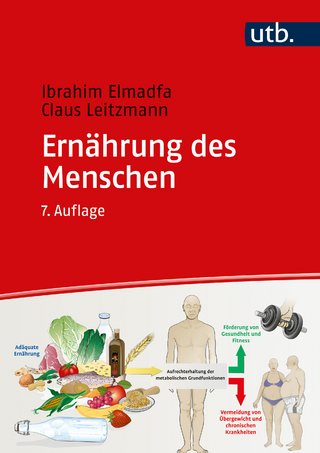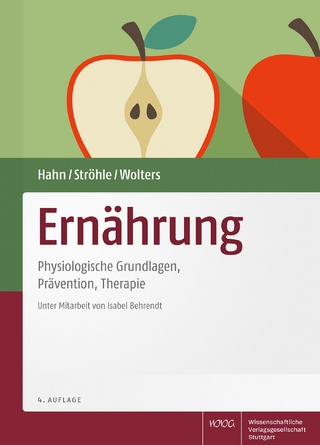
Polyphenols: Prevention and Treatment of Human Disease
Academic Press Inc (Verlag)
978-0-12-813008-7 (ISBN)
This reference fills a void in research where nutritionists and alternative therapies may be applicable.
Ronald Ross Watson, PhD, is Professor of Health Promotion Sciences at the University of Arizona, Mel and Enid Zuckerman College of Public Health. Dr. Watson began his research in public health at the Harvard School of Public Health as a Fellow in 1971 doing field work on vaccines in Saudi Arabia. He has done clinical studies in Colombia, Iran, Egypt, Saudi Arabia and the United States which provides a broad international view of public health. He has served in the military reserve hospital for 17 years with extensive training in medical responses to disasters as the chief biochemistry officer of a general hospital, retiring as a Lt. Colonel. He is a distinguished member of several national and international nutrition, immunology, and cancer societies. Dr. Watson’s career has involved studying many lifestyle aspects for their uses in health promotion. He has edited over 100 biomedical reference books and 450 papers and chapters. His teaching and research focuses on alcohol, tobacco, and drugs of abuse in heart function and disease in mouse models. Victor R. Preedy BSc, PhD, DSc, FRSB, FRSPH, FRSC, FRCPath graduated with an Honours Degree in Biology and Physiology with Pharmacology. After gaining his University of London PhD, he received his Membership of the Royal College of Pathologists. He was later awarded his second doctorate (DSc), for his contribution to protein metabolism in health and disease. He is Professor of Clinical Biochemistry (Hon) at King’s College Hospital and Emeritus Professor of Nutritional Biochemistry at King’s College London. He has Honorary Professorships at the University of Hull, and the University of Suffolk. Professor Preedy was the Founding Director and then long-term Director of the Genomics Centre at King’s College London from 2006 to 2020. Professor Preedy has been awarded fellowships of the Royal Society of Biology, the Royal College of Pathologists, the Royal Society for the Promotion of Health, the Royal Institute of Public Health, the Royal Society for Public Health, the Royal Society of Chemistry and the Royal Society of Medicine. He carried out research when attached to the National Heart Hospital (part of Imperial College London), The School of Pharmacy (now part of University College London) and the MRC Centre at Northwick Park Hospital. He has collaborated with international research groups in Finland, Japan, Australia, USA, and Germany. To his credit, Professor Preedy has published over 750 articles, which includes peer-reviewed manuscripts based on original research, abstracts and symposium presentations, reviews and edited books. Dr. Sherma Zibadi received her Ph.D. in Nutritional Sciences from the University of Arizona. Her medical degree and training were done at the Mashhad University of Medical Sciences. She then completed her post-doctoral research fellowship awarded by the American Heart Association where her research involved cardiology and complementary medicine studies. Her research has involved maladaptive cardiac remodeling process, which helps to identify new targets for treatment of heart failure. Dr. Zibadi’s research interest also extends into foods as medicines, exploring the preventive and therapeutic effects of dietary supplements on heart failure and its major risk factors in both basic animal and clinical studies, translating lab research findings into clinical practice. Dr. Zibadi is an author of more than 35 research papers in peer reviewed journals. She has been an editor on 8 scientific books like this one being proposed. She has edited on a variety of clinical topics: breast milk, bottle feeding, wheat and rice in health, polyphenols and health, omega 3 fatty acids, dietary supplements in immune modulation, and dietary fat and health. She and Dr. Watson have collaborated extensively on both laboratory research and editing.
1. The Pharmacology of Avenanthramides: Polyphenols
2. Folate Production by Lactic Acid Bacteria
3. A Triterpenoid Commonly Found in Human Diet: Ursolic Acid
4. The Major Flavonoid of Grapefruit: Naringin
5. Structural Evaluation and Toxicological Study of a Bitter Masking Bioactive Flavanone, ‘Eriodictyol’
6. Postprandial Effects of Wine Consumption Along with a Meal on the Main Pathophysiological Systems
7. Cellular and Molecular Mechanisms of Polyphenol-Induced Beneficial Effects on Cardiac Remodeling
8. Effect of Cranberry Polyphenols and Metabolites on Microbial Activity and Impact on Urinary Tract Health
9. Cranberry Polyphenols: Effects on Cardiovascular Risk Factors
10. An Insight of Polyphenols in Lung Cancer Chemoprevention
11. Mushroom Polyphenols as Chemopreventive Agents
12. Pleiotropic Molecular Effects of Dietary Polyphenols Resveratrol and Apigeninin Leukemia
13. The Polyphenolic Compound Apigenin and Applications to Cervical Cancer
14. An Outside-In and a Reciprocal Inside-Out Hypothesis Combining Resveratrol and Its High Affinity Protein NQO2 to Target iASPP for Reinstating the Activation and Stabilization of Dysfunctional WTp53 as a Melanoma Chemopreventive Approach
15. Counteracting Resistance to BRAF V600E Mutation in Melanoma Using Dietary Polyphenols
16. Role of Natural Compounds in Prevention and Treatment of Chronic Lymphocytic Leukemia
17. Polyphenols and Breast Cancer Prevention—A Summary of the Epidemiologic Evidence
18. Resveratrol Inhibitory Effects Against a Malignant Tumor: A Molecular Insight
19. Biological Activity of Resveratrol on an Ovarian Cancer Cell 231
20. Antiarthritic Effects of Turmeric and Curcumin: A Revisit
21. Effects of Polyphenols on Inflammatory-Allergic Conditions: Experimental and Clinical Evidences
22. Polyphenols and Immune System
23. Antioxidants and Polyphenols in Inflammatory Bowel Disease: Ulcerative Colitis and Crohn Disease
24. Red Propolis: Phenolics, Polyphenolics, and Applications to Microbiological Health and Disease
25. Viral Disease and Use of Polyphenolic Compounds
26. Hepatoprotective Effects of Curcumin in Alcohol-Induced Hepatotoxicity: A Memoir on the Preclinical Studies
27. Turmeric and Its Principal Polyphenol Curcumin as a Nontoxic Gastroprotective Agent: Recent Update
28. Anti-inflammatory, Immunomodulatory, and Prebiotic Properties of Dietary Flavonoids
29. Polyphenols and Polyphenol-Derived Compounds from Plants and Contact Dermatitis 349
30. Plant Polyphenols: The Futuristic Bioactive Therapeutics for Skin Care
31. Antiinflammatory Activity of Polyphenols on Dendritic Cells
32. Effects and Usage of a Citrus Compound, Limonene
33. A Phytoestrogen Puerarin and Its Health Effects
34. Galangin as a Plant Phenolic and Usage in Health and Disease
35. Can Green Tea Polyphenols Improve Phenotypes Associated with Down Syndrome?
| Erscheinungsdatum | 20.09.2018 |
|---|---|
| Verlagsort | San Diego |
| Sprache | englisch |
| Maße | 216 x 276 mm |
| Gewicht | 1560 g |
| Themenwelt | Medizin / Pharmazie ► Gesundheitsfachberufe ► Diätassistenz / Ernährungsberatung |
| Naturwissenschaften ► Biologie | |
| ISBN-10 | 0-12-813008-3 / 0128130083 |
| ISBN-13 | 978-0-12-813008-7 / 9780128130087 |
| Zustand | Neuware |
| Haben Sie eine Frage zum Produkt? |
aus dem Bereich


